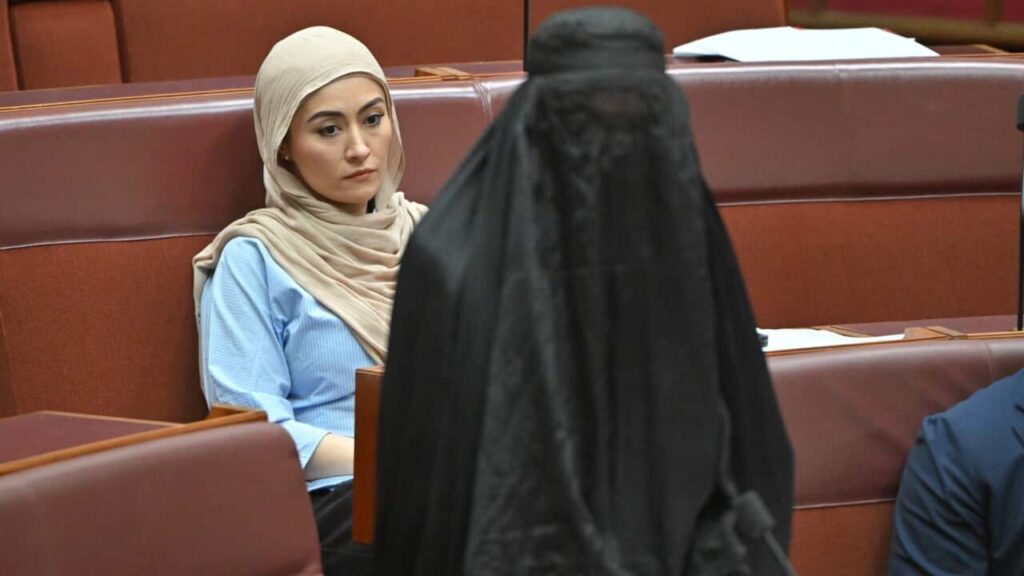
Multicultural Minister Anne Aly has strongly criticized a recent burqa stunt by One Nation leader Pauline Hanson, emphasizing the importance of “bodily autonomy” for Australian women. The incident occurred on Monday afternoon when Hanson attempted to table a motion to ban the burqa, a head-and-body covering predominantly worn by Muslim women in Afghanistan. The motion was not granted, but Hanson returned to the Senate chamber wearing a black burqa, prompting protests from fellow senators.
Speaking exclusively to SBS News, Aly expressed her disappointment, stating that the elected representative “chose to disrespect” a small cohort of women. “It’s a very, very, very small minority of women who wear a burqa,” she noted. Aly emphasized that “most Muslim women who choose to cover wear a hijab, and then there is a lot of women like me who choose not to cover. The important thing is choice.”
Political and Social Reactions
The incident has sparked significant backlash within the Senate. Senators interjected as Hanson entered the chamber in the full-body covering. According to Aly, Hanson’s actions preyed on “genuine grievances” in the community, such as housing affordability and the cost of living, for “blatant political purposes.” While Aly labeled the behavior “unacceptable” and “unworthy” of office, she refrained from suggesting specific consequences, leaving that decision to the Senate.
Senate Uproar Over Hanson’s Actions
The stunt led to an uproar among senators, with many labeling Hanson’s behavior as “racist” and “Islamophobic.” Greens senator Mehreen Faruqi, who is Muslim, accused Hanson of racism, stating, “Dress code might be the choice of the senators but racism should not be the choice of the Senate.” Similarly, Senator Fatima Payman, also Muslim, described Hanson’s actions as “disgraceful” and “unconstitutional.”
“She’s disrespecting a faith, she’s disrespecting the Muslims out there … it’s absolutely unconstitutional. This needs to be dealt with immediately before we proceed,” said Payman.
Greens leader Larissa Waters called for a reconsideration of the ruling that allowed Hanson to remain in the chamber, arguing that the stunt was “extremely racist and unsafe.”
Senate Proceedings and Consequences
Senate president Sue Lines eventually ordered Hanson to leave the chamber for being disrespectful, citing a previous ruling that using religious dress as a prop was disrespectful to the parliament. Despite this, Hanson refused to leave or remove her burqa. The chaos continued as the majority of senators voted in favor of a motion by Labor’s Penny Wong to suspend Hanson from the Senate. However, One Nation senators demanded a division be held, challenging the president’s ruling. Ultimately, the Senate was suspended following another motion by Wong.
Hanson’s Defense and Political Implications
In a press conference following her ejection, Hanson defended her actions, claiming she was denied the right to introduce a bill to ban the burqa in Australia. “What they’ve done is shut down the Australian people having the right to have their say,” Hanson argued, framing the issue as one of national security and women’s rights.
“This does not belong in Australia and at least give me the opportunity to debate it and let’s have the debate on the floor of parliament, because I do represent a large proportion of Australians out there who want to see the burqa banned,” she said.
Opposition leader Sussan Ley criticized the stunt, stating that it “weakens Senator Hanson’s case and cheapens our parliament.” Conservative senator Matt Canavan also condemned the incident, describing it as “inappropriate” and “disrespectful” to Muslim Australians. He remarked that such actions “weaken her case and cheapen our Parliament.”
Historical Context and Future Outlook
This incident is reminiscent of a similar stunt by Hanson in 2017, which also drew widespread condemnation. The ongoing debate around the burqa and religious attire in Australia highlights broader discussions on multiculturalism, religious freedom, and national identity. As the political landscape continues to evolve, the implications of such actions may influence future legislative and societal attitudes towards religious attire.
Looking forward, the Senate’s response to Hanson’s actions may set a precedent for how similar incidents are handled in the future. The broader conversation about bodily autonomy and religious freedom remains a critical issue in Australian politics, with potential ramifications for both policy and public perception.






